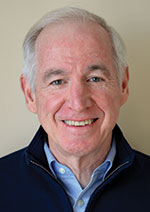Reflection / John Shaughnessy
An accusation leads to thoughts about the challenge of forgiveness
 The accusation cut deeply.
The accusation cut deeply.
Page Zyromski had just finished giving a talk about her journey of forgiveness after the brutal rape and murder of her 94-year-old great-aunt, Winnie Harman, at the hands of Stephen Todd Booker—a talk in which she shared how she had reluctantly reached out to Booker and eventually forgave him.
In her talk, Zyromski had tried to convey how much she loved Harman, whom she considered as a surrogate grandmother.
She also expressed that forgiving Booker was one of the hardest challenges of her life, but something that God had called her to do.
Still, after the talk, a woman in the audience approached Zyromski and said, “You must not have loved Winnie if you could forgive the guy who killed her.”
No words could have hurt Zyromski more.
“That really kicked me in the gut,” she recalled in a recent conversation I had with her. “So I went home and thought about that. I realized she did not understand what forgiveness was and wasn’t. So I made my little ‘Forgiveness 101.’ ”
It’s a one-page primer that offers her thoughts on a reality that all of us have faced or will face at some point in our lives: Can we forgive someone who has deeply hurt us, disappointed us and betrayed us in some way?
Here are some of the thoughts that Zyromski, a member of Immaculate Heart of Mary Parish in Indianapolis, wrote down about forgiveness—starting with what she believes forgiveness doesn’t include.
“My forgiveness does not excuse, condone or approve of the action.”
“Does not erase accountability or remove legitimate consequences.”
“Does not ignore or deny the profound way my life has changed.”
“Does not invite the other to hurt me again.”
“Does not necessarily mean reconciliation.”
“Does not forget the wrongdoing.”
She then shared what she believes forgiveness does mean and what it can achieve.
“My forgiveness gives up revenge.”
“Recognizes the humanity of the other person.”
“Frees me from the past and looks to the future.”
“Sets the captive free—to discover I have been the captive.”
“Is healing for me, no matter what happens to the other person.”
“Is the key to the whole Christian life.”
Indeed, Christ certainly made forgiveness a major focus of his teaching, his ministry and his life—a life marked by many accusations against him. And there’s no doubt that forgiveness is a central theme that resonates through the days of Lent and through the Passion, death and resurrection of Christ.
At every turn, Christ lived up to his challenge to Peter that we should forgive someone not just seven times, but 70 times seven, a way of saying that our forgiveness should never be limited.
So Christ forgave Peter, James and John when they fell asleep in the Garden of Gethsemane.
He forgave Peter when he betrayed him three times.
He forgave the Good Thief as they both hung on their crosses.
His last words included, “Father, forgive them for they know not what they do” (Lk 23:34).
And by his death on the cross, he also forgives and redeems us.
Christ’s approach of forgiveness is one of the defining challenges of life for all of us who seek to follow him.
Can we forgive someone who has deeply hurt us, disappointed us and betrayed us?
(John Shaughnessy is the assistant editor of The Criterion.) †
 The accusation cut deeply.
The accusation cut deeply.